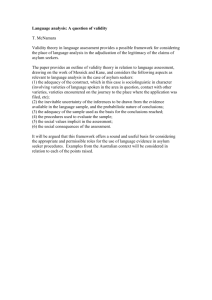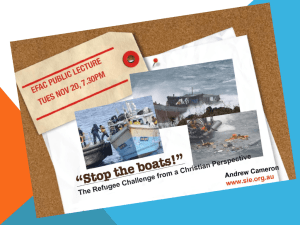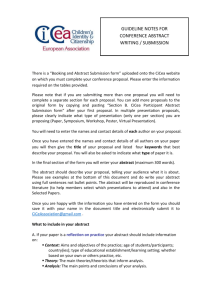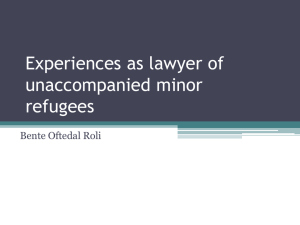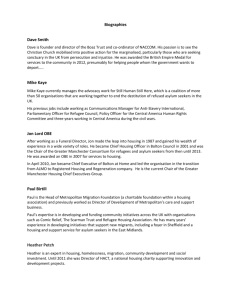INFORMATION
advertisement
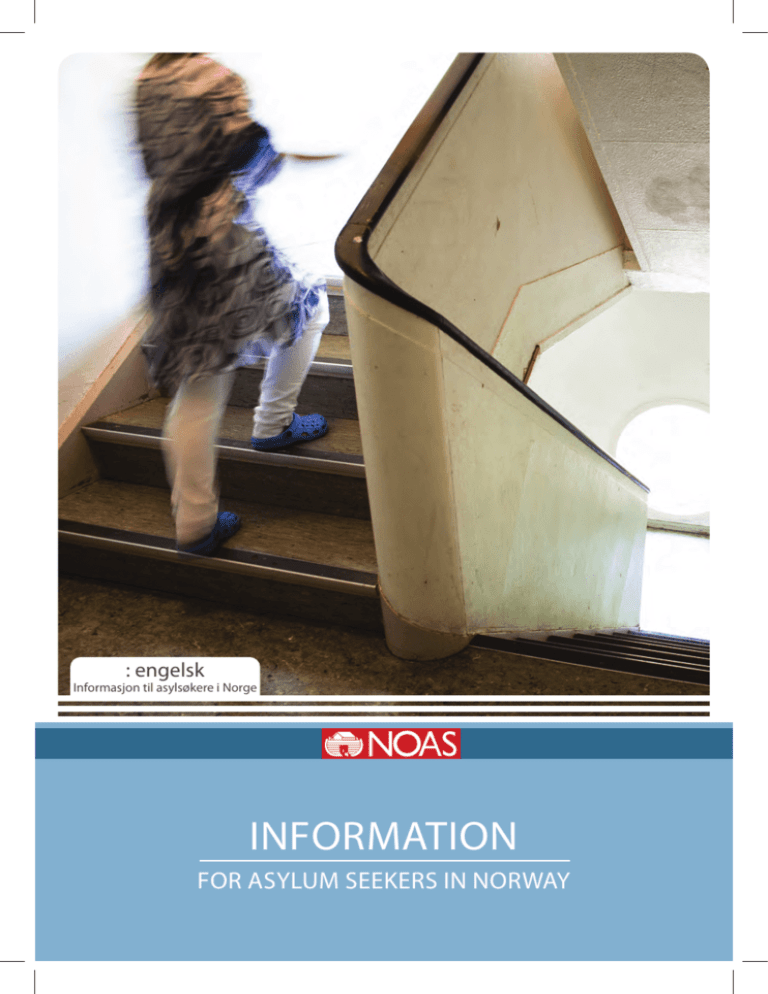
: engelsk Informasjon til asylsøkere i Norge INFORMATION FOR ASYLUM SEEKERS IN NORWAY NOAS 2011 02 This brochure has been prepared by the Norwegian Organisation for Asylum Seekers (NOAS). NOAS is a non-governmental human rights organisation that provides information and legal assistance for asylum seekers. The brochure contains important information for asylum seekers applying for protection in Norway. HERE YOU CAN READ ABOUT: • Who has the right to protection? • Who can be granted a residence permit on humanitarian grounds? • Which country will review your asylum application? • Who will process your asylum application in Norway? • What happens when you apply for protection? • Important advice for the asylum interview • Your obligations and rights as an asylum seeker • Duty to maintain confidentiality NOAS 2011 03 1. WHO HAS THE RIGHT TO PROTECTION? You have the right to protection, i.e. asylum, if you are at risk of being killed, tortured or exposed to other serious violation if you return to your homeland. If the authorities in your homeland can protect you, or if there are safe areas for you in your homeland, you will normally not have the right to protection in Norway. The people who are entitled to protection are established in international agreements that Norway is obliged to follow. 2. WHO CAN BE GRANTED RESIDENCE ON HUMANITARIAN GROUNDS? If you do not have the right to claim protection, the authorities will assess whether you meet the terms for being granted residence on strong humanitarian grounds or due to a particular affiliation with Norway. This is known as eligibility for residence on humanitarian grounds. You must generally have a passport to be granted this type of residence. If you have not presented a passport to the authorities, this could result in your application being rejected or you being granted a restricted residence permit that does not allow permanent residence or your family to immigrate with you. 3. WHICH COUNTRY WILL REVIEW YOUR ASYLUM APPLICATION? Not everyone who applies for protection in Norway has their application processed in Norway. The Dublin Agreement is a collaboration between European countries which ensures that asylum seekers only have their application processed in one of the countries covered by the Agreement. Your application could be processed in another country covered by the Dublin Agreement if – in the country in question: • Your fingerprints have been registered • You have applied for asylum • You have a visa or residence permit • You have close family It normally takes two to six months for the Norwegian authorities to investigate and decide whether you should be transferred to another country. If you require further information, you can obtain a separate brochure on the Dublin Agreement from NOAS. 4. WHO WILL PROCESS YOUR ASYLUM APPLICATION IN NORWAY? The Norwegian Directorate of Immigration (UDI) is part of the Norwegian government. The Directorate’s staff will interview you and decide whether or not you will be granted residence. The UDI assesses all asylum applications carefully and treats each application on its own merits. NOAS 2011 04 5. WHAT HAPPENS WHEN YOU APPLY FOR PROTECTION? You register as an asylum seeker with the police The police will take your picture and fingerprints. They will ask you about your identity, how you got to Norway and why you are applying for protection. UDI will ask you why you are applying for protection. If you have identity papers with you, you will have to present these during registration. You will be moved to a reception centre After registration you will be driven to a reception centre. You will remain here for a few days before being moved to another temporary or a normal reception centre. You will be given more information on your obligations and rights by the staff at the centre. You will be tested for tuberculosis During your first few days at the reception centre you will be tested for tuberculosis. This is compulsory for everyone. If you have a serious health problem that requires urgent treatment, you should inform the health centre of this. You will receive information and guidance from NOAS During your first days at the reception centre you will receive information from NOAS. NOAS is a non-governmental human rights organisation that represents asylum seekers’ rights in Norway. NOAS’ role at the reception centre is to provide information and guidance for asylum seekers. You will be shown an information film on the asylum procedure and talk with an NOAS staff member. The purpose of the talk is to prepare you for your interview with the UDI.It is important that you use the talk to ask any questions you may have on applying for protection. The talk will be held in a language you understand well. NOAS 2011 05 If it is probable that you will be transferred to another European country in accordance with the Dublin Agreement, it is important that you mention this to make sure you receive the correct information. NOAS’ staff have a duty of confidentiality. You will be interviewed by the UDI The asylum interview is the most important opportunity to explain why you are applying for protection. The asylum interview normally lasts several hours. Explain concretely and in detail your experiences and what you would be afraid of if you had to return to your homeland. An interpreter will be present during the interview. The interpreter has a duty of confidentiality and is neutral. If you have any problems understanding what is being said, you should immediately advise the interviewer. At the end of the asylum interview you sign a report on what has been said during the interview. The interpreter will read this out to you. If you wish to change anything in the report, you must mention this before you sign. You move to a normal reception centre where you live while you are waiting for a reply from the UDI Accommodation at the reception centre is free. If you wish, you can live privately while you are waiting for a response from the UDI, but then you will not receive any financial support. If you move, you must report this to the reception centre, which will register your new address. It is important that your address is registered as this will allow the UDI’s response to reach you. New information If you receive new information that is important for your asylum application after the asylum interview, you should inform the UDI immediately. Explain why you did not mention this information earlier. The centre’s staff can explain to you how to do this. NOAS 2011 06 You await a response from the UDI The UDI can take anything from a few weeks to more than a year to process your asylum application. If it takes a long time, this could be because the UDI has to investigate whether the information you have given is correct. This could also be because the UDI is investigating the situation in your homeland, or because lots of other people are waiting for responses from the UDI. You will get a response from the UDI: Residence permit or rejection Residence permit If you receive a residence permit, you will receive an offer to be housed in a local municipality. You will receive more information at the reception centre. Rejection If your application is rejected, you have the right to appeal. You will receive a certain number of hours of legal advice, normally five hours, to help you with your appeal. You must appeal within three weeks. You can normally remain in Norway while your appeal is being processed, but not if the UDI believes that your application is clearly groundless. The Norwegian Immigration Appeals Board (UNE) The UNE will assess your appeal. The UNE can summon you to a meeting or ask you to present extra information. If you receive a rejection, you are obliged to return to your homeland You must then return home within the deadline established by the police, normally two weeks. Once this deadline has passed, you will not have the legal right to reside in Norway. If you receive a final rejection, i.e. if the UNE upholds the UDI’s rejection of protection, you can either choose to return voluntarily with the International Organization for Migration (IOM), or be escorted out the country by the police (forced return). Voluntary return with the IOM The Norwegian authorities will arrange for you to return to your homeland voluntarily. Voluntary return means that you collaborate on your journey home by applying for acceptance under the return programme in Norway called the Voluntary Assisted Return Programme (VARP). The VARP is a collaboration between the UDI and IOM, who arrange your journey home. When you return voluntarily, the Norwegian government pays for your return. Anyone who does not have a residence permit in Norway can apply for voluntary return. If your asylum application is rejected, you have a limited time to leave Norway. If you wish to return voluntarily, you should send an application to the IOM shortly after your asylum application has been rejected. If your application is approved, the IOM will guide you and help you obtain travel documents and book tickets. To be able to travel with the IOM you must have a valid passport or other travel document issued by the authorities in your NOAS 2011 07 homeland. If you do not have a valid passport or travel document, the IOM will be able to help you apply for one from your nearest embassy/consulate. The IOM will also assist you during the journey and on arrival in your homeland, if you wish. You can obtain more information on voluntary return and help completing your application form from your reception centre, the UDI’s regional office or the IOM. Forced return If after final rejection you do not return home voluntarily, you will be escorted out of the country by the police once your deadline has passed. You have to pay for your escorted return yourself. If you are unable to pay for the flight ticket, the government will pay for this, but you will be obliged to repay the costs. If you do not pay for your escorted return, you could be denied a visa and entry into Norway and other European countries at a later date. NOAS 2011 08 If you commit a criminal act If you commit a criminal act, your asylum application will be processed extremely rapidly, meaning you could quickly be ordered to leave Norway. If you do something illegal you could also be expelled from Norway, which means you will not be able to enter Norway or most other European countries at a later date. 6. IMPORTANT ADVICE FOR THE ASYLUM INTERVIEW • Explain thoroughly and in detail why you had to leave your homeland and what you are afraid of if you return. • Focus on what you have experienced and what will happen to you if you have to • • • • • return. Be as precise as possible. If you have any children under 18 years of age with you, explain their situation and what they have experienced. Ask the interviewer to explain if there is anything you do not understand. If you have documents that are relevant for your asylum application, you should take these to the interview. Tell the truth. If you say something that is not true, this could result in your asylum application being rejected. You could also be expelled from Norway, which will result in you not being able to enter Norway and most other European countries at a later date. Female asylum seekers Women can be subject to other forms of persecution than men. These can be difficult to talk about, perhaps in particular to men. If you wish, you can talk with a female member of staff at NOAS. If you wish to do this, advise NOAS as soon as possible after having watched the information film. You can also request a female interviewer and female interpreter for your interview with the UDI. You can advise this during the talks with NOAS.. Have you brought any children under 18 years of age with you? The child’s situation is important in assessing the position of the asylum seeker. The UDI wishes to find out both whether the child has his/her own grounds for claiming asylum, and how the child views his/her life situation. It is important that you tell the UDI about this during the asylum interview. The UDI interviews children over the age of seven. It is important that the child has a chance to explain in his/her own words what he/she has experienced. Sometimes children experience problems more intensely than adults. The UDI never interviews children unless the children themselves want to be interviewed. 7. YOUR OBLIGATIONS AND RIGHTS AS AN ASYLUM SEEKER You have an obligation to help clarify your identity It is important that the Norwegian authorities know who you are. It is therefore important NOAS 2011 09 that you supply documents that can confirm your identity. If you are being persecuted by the authorities in your homeland, the Norwegian authorities will not require you to contact them to obtain identity documents. If the Norwegian authorities have doubts about your identity, you will risk: • Not being believed • Reducing the chance of being granted residence • Losing rights you would otherwise have been granted • Being granted a restricted residence permit You have a duty to provide accurate information As an asylum seeker you must explain why you are applying for protection. Therefore you must do your best to collaborate and present the necessary documentation. Regardless of what you may have heard before you applied for protection, it is important that you explain to the Norwegian authorities the correct background for your asylum application. It is a criminal offence to give inaccurate information. It could also result in expulsion. You may have the right to work while you are seeking asylum You can receive a work permit while you are waiting for your asylum application to be processed, if you can document your identity, and you are not being processed under the Dublin Agreement. The work permit is valid for up to six months, but can be renewed. You have the right to receive medical treatment You have the right to receive medical treatment you need while you are waiting for your asylum application to be processed. Medical treatment for children under 12 years of age is free. Everyone in Norway must usually make a contribution to their medical treatment. If you need help from a psychologist, you can apply to the UDI to pay your expenses. Contact the reception centre staff for further information. If you have serious health problems, you should inform the UDI. You may withdraw your asylum application You can withdraw your asylum application at any time. It could then be possible for you to apply to the IOM for help travelling home. 8. DUTY TO MAINTAIN CONFIDENTIALITY The police, UDI, UNE, interpreter, lawyer, health personnel and NOAS have a duty to maintain confidentiality. This means that they cannot give information on your asylum application to the authorities in your homeland. They can also not report what you have said to people who are not working on your asylum application. Breaking the duty of confidentiality is a criminal offence. You therefore do not need to be afraid of explaining in detail why you need protection. NOAS 2011 10 ADDRESSES THE POLICE IMMIGRATION UNIT (POLITIETS UTLENDINGSENHET) The police register newly arrived asylum seekers. The police also repatriate asylum seekers who do not leave Norway voluntarily once they have had their asylum applications rejected. Postal address: Postboks 8102 Dep., NO-0032 Oslo, Norway Visiting address: Christian Krohgs gate 32, 0186 Oslo Tel.: +47 22 34 24 00, Fax: +47 22 34 24 80 E-mail: pu@politiet.no THE NORWEGIAN IMMIGRATION DIRECTORATE (UDI) is a government institution whose duties include processing asylum applications, visas and national citizenship matters, and reuniting families. The UDI is also responsible for reception centres. Postal address: Postboks 8108 Dep., NO-0032 Oslo, Norway Visiting address: Hausmannsgt. 21, 0182 Oslo Tel.: +47 23 35 15 00, Fax: +47 23 35 15 01 Website: www.udi.no, E-mail: ots@udi.no INTERNATIONAL ORGANIZATION FOR MIGRATION (IOM) Information on assisted voluntary return Postal address: Postboks 8927 Youngstorget, 0028 Oslo , Norway Visiting address: Storgata 10a, 2. etg, 0155 Oslo Tel.: +47 23 10 53 20, Fax: +47 23 10 53 21 E-mail: osloreturn@iom.int Opening hours: Weekdays: 10:00 – 15:00, Weekends: Closed NOAS 2011 11 THE NORWEGIAN IMMIGRATION APPEALS BOARD (UTLENDINGSNEMNDA – UNE) is a quasi-judicial administration body that processes appeals relating to rejections made by the UDI. Postal address: Postboks 8165 Dep., 0034 Oslo, Norway Visiting address: Stenersgt. 1B/C, 0050 Oslo Tel.: +47 21 08 50 00, Fax: +47 21 08 50 01 Website: www.une.no, E-mail: postmottak@une.no THE NORWEGIAN RED CROSS (NORGES RØDE KORS) tracing services, assist in re-establishing contact between family members who have been separated due to war, conflict or catastrophes. The Red Cross does not provide information on you to the UDI or others. The service is free. Postal address: Postboks 1 Grønland, 0133 Oslo, Norway Visiting address: Hausmannsgt. 7, 0186 Oslo Tel.: +47 22 05 40 00 Website: www.rodekors.no, E-mail: tracing@redcross.no NOAS is a non-governmental human rights organisation that provides information and legal assistance for asylum seekers. The brochure contains important information for asylum seekers applying for protection in Norway. Norwegian Organisation for Asylum Seekers (NOAS) Visiting address: Torggata 22, 0183 Oslo, Norway Postal address: P.O. Box 8893 Youngstorget, NO-0028 Oslo, Norway Tel.: +47 22 36 56 60, Fax: +47 22 36 56 61 Website: www.noas.org, E-mail: noas@noas.org
